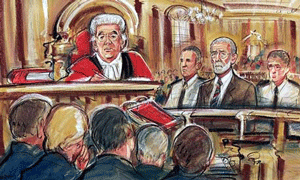 There’s a principle in law that applies around the world. And it is that everyone is entitled to a fair trial.
There’s a principle in law that applies around the world. And it is that everyone is entitled to a fair trial.
Start messing with that and you could end up in deep trouble as 29-year old Joseph Beard recently found out to his cost.
Beard was called to serve as a juror in Kingston Crown Court in Surrey but hadn’t counted on appearing in the dock himself before Sir John Thomas of the Queen’s Bench Division at the Royal Courts of Justice and ended up with a criminal record in the process.
But that’s exactly what happened.
Beard was in the fifth week of a criminal trial estimated to take six weeks. Significantly, because of a series of delays and lengthy legal arguments, the prosecution was only about half way through its case. The case was “dragging” and there were lost days when jurors weren’t required and hours sitting in the jury room with little or no information. Beard became understandably frustrated at the slow progress of the trial and was itching to get back to his job as a building site manager. What he did next was to change his life forever.
On his mobile he searched the extent of the case against the two defendants and how many more witnesses the jury were likely to hear from, so that he could work out how long the case was going to last!
And then when he discovered that there were 1,800 potential victims he shared this information with the other jurors. When the trial judge heard this had happened, the matter was referred to the Attorney General, Dominic Grieve QC who swiftly brought civil contempt of court proceedings against Beard, who now found himself on the wrong side of the law.
The charge was that Beard intended to prejudice the administration of justice. And he was found guilty of contempt because when he decided to use the internet to find out information, he knew that he was not only deliberately breaking the direction of the trial judge but also interfering with the administration of justice.
Critically for Beard his intent to prejudice the administration of justice was established if he should have foreseen by his action that such prejudice might be caused.
What this case vividly illustrates is that UK courts are determined to clamp down on jurors who use the internet or social media to obtain material not referred to during trial or to post messages which impugn the impartial status of a sitting jury.
And there’s no excuse for not knowing this as jurors are always given warnings at the start of trials, both written and oral, from the trial judge that any accessing of material on the internet could result in the offending juror facing contempt proceedings.
As Sir John Thomas observed in his judgment on Beard, the instructions and directions to jurors needed to be consistent throughout the courts and to this extent he made it clear that he will require the Civil Procedure Rules Committee and the Judicial Studies Board, which gives directions to criminal judges, to provide every criminal court jury with the same direction.
This will ensure that there can’t be any suggestion of confusion or misunderstanding of the kind that formed the basis of the defence of Beard in the High Court.
In the future, jurors will be told and left in no doubt that any accessing of the internet or comments on social media which could display their bias or be perceived as such will be treated as contempt. It will be difficult for them to argue that they didn’t foresee the consequences of their actions.
What’s also clear is that if any juror is found to be in contempt, it will be “almost inevitable” that they’ll receive an immediate custodial sentence.
On the case law this will range between two to six months, banged up in Pentonville prison, one of the toughest prison in the UK.














Recent Comments